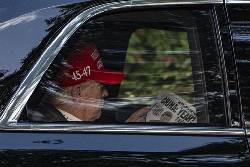WASHINGTON (AP) — Not even 24 hours after his party lost a key Wisconsin race and underperformed in Florida, President Donald Trump followed the playbook that has defined his political career: He doubled down.
Trump’s move on Wednesday to place stiff new tariffs on imports from nearly all U.S. trading partners marks an all-in bet by the Republican that his once-fringe economic vision will pay off for Americans. It was the realization of his four decades of advocacy for a protectionist foreign policy and the belief that free trade was forcing the United States into decline as its economy shifted from manufacturing to services.
The tariff announcement was the latest and perhaps boldest manifestation of Trump’s second-term freedom to lead with his instincts after feeling his first turn in the Oval Office was restrained by aides who did not share his worldview. How it shakes out could be a defining judgment on his presidency.
The early reviews have been worrisome.
Financial markets had their worst week since the onset of the COVID-19 pandemic, foreign trade partners retaliated and economists warned that the import taxes may boost inflation and potentially send the U.S. into a recession. It's now Republican lawmakers who are fretting about their party’s future while Democrats feel newly buoyant over what they see as Trump’s overreach.
Democratic activists planned to participate in rallies across the country Saturday in what was shaping up as the largest demonstrations since Trump returned to office in January. “The winds are changing,” said Rahna Epting, who leads MoveOn, one of many organizing groups.
Trump is unbowed.
He has promised that the taxes on imports will bring about a domestic manufacturing renaissance and help fund an extension of his 2017 tax cuts. He insisted on Thursday as the Dow Jones fell by 1,600 points that things were “going very well” and the economy would “boom," then spent Friday at the golf course as the index plunged 2,200 more points.
In his first term, Trump’s tariff threats brought world leaders to his door to cut deals. This time, his actions so far have led to steep retaliation from China and promises from European allies to push back.
Even some Trump supporters are having their doubts.
Frank Amoroso, a 78-year-old resident of Dewitt, Michigan, said he is concerned about short-term rising interest rates and inflation, although he believes the tariffs will be good for the country in the long run.
Amoroso, a retired automotive engineer who voted for Trump, said he would give the president’s second-term performance a C-plus or B-minus. “I think he’s doing things too fast,” he said. “But hopefully things will get done in a prudent way, and the economy will survive a little downfall.”
Rep. French Hill, R-Ark., in a telephone town hall with constituents on Thursday night, expressed reservations about the broad nature of the tariffs.
Hill, who represents a district that includes Little Rock, said he does not back tariffs on Canada and Mexico. He said the administration should instead focus on renegotiating a U.S. trade agreement with its two neighbors.
“I don’t support across-the-board tariffs as a general matter, and so I don’t support those, and I will be urging changes there because I don’t think they will end up raising a bunch of revenue that’s been asserted,” Hill said. “I wish I thought they did, but personally I don’t think they will. But I do support trade diplomacy.”
Still, much of Trump's “Make America Great Again” coalition remains publicly supportive.
Doug Deason, a prominent Texas-based Republican donor, said he loves the president's tariff plan, even if it causes some economic disruption.
“He told us during the election there would be pain for every American to get this ship turned around,” Deason said. “It is hard to watch our portfolios deteriorate so much, but we get it. We hope he holds course.”
As Trump struggles with the economy, Democrats are beginning to emerge from the cloud of doom that has consumed their party ever since their election drubbing in November.
They scored a decisive victory in Wisconsin’s high-profile state Supreme Court election on Tuesday, even after Elon Musk and his affiliated groups poured more than $20 million into the contest. New Jersey Sen. Cory Booker then breathed new life into the Democratic resistance by delivering a record 25-hour-long speech on the Senate floor that centered on a call for his party to find its resolve.
Booker told The Associated Press afterward that a significant political shift has begun even as his party tries to learn from its mistakes in the 2024 presidential election.
“I think you’re seeing a lot more energy, a lot more determination, a lot more feeling like we’ve got to fight,” Booker said. “You can’t sit back any more. You can’t sit on the sidelines. There’s a larger, growing movement.”
Booker, a 2020 presidential candidate, acknowledged he is not ruling out a 2028 run, although he said he is focused on his 2026 Senate reelection for now.
There is broad agreement among Democrats — and even some Republicans, privately at least — that what Trump has unleashed on the global economy could help accelerate the Democratic comeback.
Ezra Levin, co-founder of the progressive resistance group known as Indivisible, has been critical of Democratic officials’ response in recent weeks to Trump’s leadership. But on Friday, he was somewhat giddy about the political consequences for Trump’s GOP after the tariffs announcement.
“Raising prices across the board for your constituents is not popular,” Levin said. “It’s the kind of thing that can lead to a 1932-style total generational wipe out of a party.”
___
Peoples reported from New York. Associated Press writers Andrew DeMillo in Little Rock, Arkansas, and Isabella Volmert in Dewitt, Michigan, contributed to this report.
...


 Copyright © 1996 - 2025 CoreComm Internet Services, Inc. All Rights Reserved. | View our
Copyright © 1996 - 2025 CoreComm Internet Services, Inc. All Rights Reserved. | View our